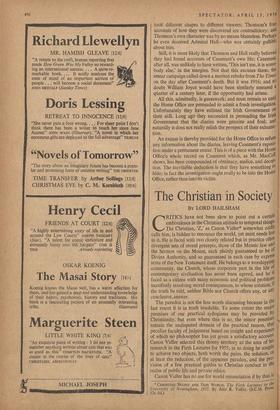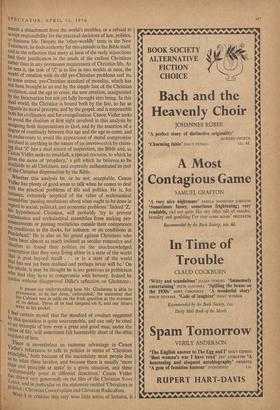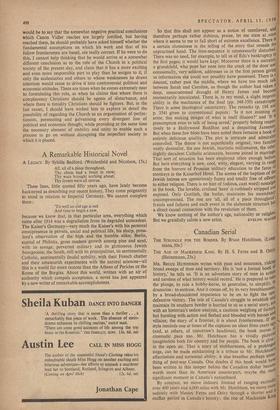The Christian in Society
BY LORD HAILSHAM RIT1CS have not been slow to point out a certain ambivalence in the Christian attitude to temporal things. The Christian, 'Z,' as Canon Vidler* somewhat oddlY calls him, is bidden to renounce the world, yet must needs live in it. He is faced with two closely rejated but in practice often divergent sets of moral precepts, those of the Mosaic law and the Sermon on the Mount, each plainly guaranteed to be of Divine Authority, and so guaranteed in each case by express texts of the New Testament itself. He belongs to a worshippill community, the Church, whose corporate part in the life of I contemporary civilisation has never been agreed, and he s faced as a citizen with many economic and political problents manifestly involving moral consequences, to whose solution, If the truth be told, neither Bible nor Church offers any, or :MY conclusive, answer.
The paradox is not the less worth discussing because in the last resort it is in truth insoluble. To some extent the major premises of our practical syllogisms may be provided hY Christianity, but even where this is so, the minor premises remain the undisputed domain of the practical reason, thilt peculiar faculty of judgement based on insight and experience of which no philosopher has yet given a satisfactory account. Canon Vidler selected this thorny territory as the area of his research in the Firth Lectures for 1955; in so doing he sought to achieve two objects, both worth the pains, the solution, 01 at least the reduction, of the apparent paradox, and the pro' vision of a few practical guides to Christian conduct in the realm of public life and private ethics. Canon Vidler has no use for world renunciation if by that is *CHRISTIAN BELIEF AND THIS WORLD. The Firth Lectures in the University of Nottingham, 1955. By Alec R. Vidler. press, Its. od.) meant a detachment from the world's troubles, or a refusal to accept responsibility for the practical decisions of law, politics, or business life. Despite the 'other-worldly' texts in the New Testament, he finds authority for this attitude in the Bible itself. and in the reflecti6n that many at least of the early injunctions find their justification in the needs of the earliest Christians rather than in any permanent requirement of Christian. life. As he sees it, the task of 'Z' is to live in two worlds at once, the world of creation with its old pre-Christian problems and its, to some extent, pre-Christian standard of morality, which has not been brought to an end by the simple fact of the Christian revelation, and the age to come, the new creation, inaugurated by the Incarnation but not yet fully brought into being. In this dual world, the Christian is bound both by the law, so far as regards its moral precepts, and by the gospel, and is responsible both for civilisation and for evangelisation. Canon Vidler seeks to avoid the dualism at first sight involved in this analysis by assigning both dispensations to God, and by the assertion of a degree of continuity between this age and the age to come, and Ile endeavours to avoid the appearance of moral compromise involved in anything in the nature of an interimsethik by claim- ing that 'Z' has a dual source of inspiration, the Bible arid, as Canon Vidler seeks to establish, a special resource, to which he gives the name of 'prophecy,' a gift which he believes to be available to all Christians. and expressly authenticated as part of the Christian dispensation by the Bible. Whether this analysis be, or be not, acceptable, Canon Vidler has plenty of good sense to talk when he comes to deal with the practical problems of life and politics. He is, for instance, extremely sceptical of the value of ecclesiastical assemblies 'passing resolutions about what ought to be done in rbegard to social, political, and economic problems.' Indeed `Z,' hypdthetical Christian, will probably 'try to prevent ecclesiastics and ecclesiastical assemblies from making pro- nouncements or passing resolutions outside their competence 13,n conditions in the docks, for instance, or on conditions in nndoland.' He is also on his guard against Christians who !lave been almost as much inclined as secular romantics and idealists to found their politics on the unacknowledged assumption that they were living either in a state of the world that is past beyond recall . . . or in a state of the world that has not yet been realised and perhaps never will be.' On the whole, it may be thought he is too generous to politicians who find they have to compromise with honesty. Indeed_ he , quotes without disapproval Dilke's reflection on Gladstone : passes my understanding how Mr. Gladstone is able to Pronounce, as he has done, 'unfounded,' the statement that the Cabinet was at odds on the Irish question at the moment of its defeat. Three of us had resigned on it, and our letters Were in his pocket. l feel certain myself that the standard of conduct suggested by this quotation is quite unacceptable, and can only be cited as an example of how even a great and good man, under the stress of life, will sometimes fall lamentably short of the ethic required of him. _ There is nevertheless an immense advantage in Canon Vtdler's reluctance to talk in politics in terms of 'Christian Principles; both because of the uncertainty most people feel as th what these involve, and because there is usually 'more than one principle at stake' in a given situation, and these has point in different directions.' Canon Vidler l.as drawn very generously on the files of the Christian News L'.t.ter, and in particular on the statement entitled 'Christians in Politics : Christian Conservatism and Christian Radicalism. Were I to criticise this very wise little series of lectures, it would be to say that the somewhat negative practical conclusions which Canon Vidler reaches are largely justified, but having reached them, he should probably have asked himself whether the fundamental assumptions on which his work and that of his fellow frontiersmen are based, are really correct. If he were to do this, I cannot help thinking that he would arrive at a somewhat different conclusion as to the role of the Church in a political society of the present day, and claim that it has a more exciting and even more responsible part to play than he assigns to it, if only the ecclesiastics and others to whose weaknesses he draws attention would cease to drive it into controversial political and economic attitudes. There are times when he comes extremely near to formulating this role, as when he claims that where there is complacency Christians should be agents of disturbance, and where there is timidity Christians should be fighters. But, in the last resort, 1 should have wished him to explore in detail the possibility of regarding the Church as an organisation of -perfec- tionists, permeating and galvanising every divergent line of political and economic thought, while providing at the same time the necessary element of stability and unity to enable such a process to go on without disrupting the imperfect society in which it is placed.












































 Previous page
Previous page